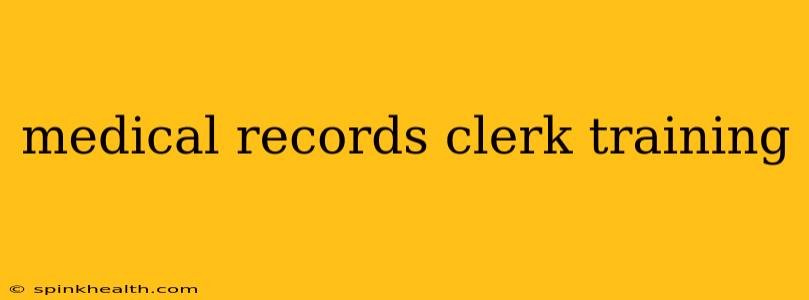The crisp scent of antiseptic, the quiet hum of the office, the vital role in ensuring patient care – this is the world of a medical records clerk. It's a field demanding precision, organization, and a keen eye for detail. But how do you enter this crucial healthcare profession? This guide dives into the world of medical records clerk training, exploring everything from essential skills to career prospects. Let's begin our journey.
Imagine yourself seamlessly navigating mountains of patient data, ensuring confidentiality, and contributing to the smooth operation of a healthcare facility. That's the power of a well-trained medical records clerk. This isn't just about filing; it's about safeguarding sensitive information, facilitating efficient medical practice, and ultimately, improving patient outcomes.
What are the Key Skills Needed to Become a Medical Records Clerk?
This isn't just about shuffling papers; it's about managing sensitive data with precision and accuracy. To succeed, you'll need a blend of hard and soft skills.
Hard Skills: These are the technical abilities you'll learn through training and experience:
- Medical Terminology: Understanding medical jargon is crucial for accurate record-keeping and communication with healthcare professionals.
- Electronic Health Records (EHR) Software Proficiency: Most clinics and hospitals use EHR systems, requiring familiarity with specific software like Epic, Cerner, or Meditech.
- Medical Coding and Billing: While not always required, understanding basic coding (ICD, CPT) can be a significant advantage.
- Data Entry and Management: Accurate and efficient data entry is paramount, often involving high volumes of information.
- Record Keeping and Filing Systems: Maintaining organized physical and electronic files is critical for efficient retrieval.
- HIPAA Compliance: Understanding and adhering to the Health Insurance Portability and Accountability Act is non-negotiable to protect patient privacy.
Soft Skills: These are the interpersonal and personal attributes that contribute to success:
- Attention to Detail: Errors can have serious consequences; accuracy is essential.
- Organizational Skills: Managing large volumes of information requires excellent organization.
- Time Management: Meeting deadlines and managing multiple tasks simultaneously are key.
- Communication Skills: Interacting with patients, doctors, and other staff requires clear and professional communication.
- Problem-Solving Skills: The ability to identify and resolve issues efficiently is crucial.
- Confidentiality: Handling sensitive patient information with utmost discretion is paramount.
What Kind of Training is Required to Become a Medical Records Clerk?
The pathway to becoming a medical records clerk can vary, but generally includes:
- Formal Education: Many pursue a certificate or associate's degree in health information technology, medical office administration, or a related field. These programs provide comprehensive training in medical terminology, record-keeping, and EHR software.
- On-the-Job Training: Some clinics and hospitals offer on-the-job training, allowing you to learn practical skills while working. This often complements formal education.
- Continuing Education: The healthcare industry is constantly evolving, so ongoing education is vital to keep your skills sharp and up-to-date with new technologies and regulations.
What are the Educational Requirements for a Medical Records Clerk?
While a high school diploma or GED is usually the minimum requirement, a post-secondary credential significantly enhances your job prospects. A certificate or associate's degree demonstrates a strong commitment to the profession and provides a deeper understanding of the field.
What is the Career Path and Salary for a Medical Records Clerk?
The career path for medical records clerks can lead to various opportunities, including:
- Senior Medical Records Clerk: Increased responsibility and potentially supervisory roles.
- Health Information Technician: Advanced training and certification lead to a broader scope of responsibilities.
- Release of Information Specialist: Focusing on managing the release of patient information.
Salaries vary depending on location, experience, and education. However, you can expect a competitive salary with opportunities for growth.
How Much Does a Medical Records Clerk Make?
Salaries vary based on factors like location, experience, and employer. Researching average salaries in your specific area provides a clearer picture.
How Long Does it Take to Become a Medical Records Clerk?
The time it takes depends on the chosen training path. Certificate programs might take a few months to a year, while associate degrees typically take two years.
What are the Job Outlook and Job Growth Projections for Medical Records Clerks?
The job outlook for medical records clerks is generally positive, with ongoing demand driven by the healthcare industry's continued growth and increasing reliance on electronic health records.
In conclusion, becoming a medical records clerk is a rewarding career path for individuals with a meticulous nature and a dedication to patient care. By pursuing appropriate training and developing essential skills, you can chart a successful course in this vital healthcare profession. Remember, the journey begins with the first step – researching training options and taking that leap into the fascinating world of medical records management.

